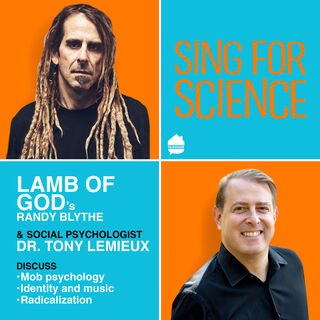Motivated Reasoning
What’s in a Song? Exploring Social Commentary in Lyrics
A conversation between a metal singer and a psychologist.
Posted January 18, 2022 Reviewed by Ekua Hagan
Key points
- "Reactional identities" that people form can influence who they listen to and what they consider to be credible.
- Social ecosystems in which "facts" are presented without context or nuance can lead to scapegoating, blaming, hostility, and hatred.
- Music can serve to build a broader and more inclusive sense of both self and community.

I was recently fortunate enough to be able to join in conversation with Randy Blythe, vocalist for the band Lamb of God in an episode of the Sing for Science podcast.
There’s a bit of a backstory about how this came together—the short version is that I heard about the Sing for Science podcast, checked out some episodes (including one with Living Colour about their song Cult of Personality and the topic of authoritarianism in conversation with Dr. Ruth Ben-Ghiat), and I was sold. What an incredible concept—to connect songwriters and performers with researchers who work on topics related to their lyrics!
Thinking about my own research and what artists have lyrics and perspectives that connect, I immediately thought of Lamb of God. Not only because I really appreciate their music, but because the social incisiveness of the lyrics and the topics of intergroup conflict, social identities, extremism, and polarization are things that we both write about. In Randy’s case of crafting lyrics, it’s in the context of a hugely influential band with multiple Grammy nominations; and in my case, it’s in the context of academic research with a somewhat smaller following. Fortunately, we got a chance to do an episode together and covered a lot of ground on themes that are central to my blog at Psychology Today.
Checkmate
In the Lamb of God song "Checkmate," themes of extreme polarization, fueled by destructive leadership, mis- and disinformation, and the resultant consequences are front and center. In the Sing for Science episode, we talked about some of the experiences and perspectives that informed Randy’s writing of the lyrics, and the research (including my own) that addresses the phenomena. We covered a lot of ground.
One of the things that sticks with me is how Randy sings about the "reactional identities" that people form and how that subsequently influences what and who they listen to, what they consider to be credible information, and especially what (and who) they consider to be an existential threat. Based on years of research, we know that in highly polarized contexts the possibility of finding common ground becomes a monumentally difficult task. Not only do people have a harder time seeing alternate viewpoints, possibilities, and perspectives, but there become fewer possibilities for people "in the middle" to try to avoid getting drawn into the conflict. In "Checkmate" this notion is poignantly captured in the lyric:
“you try to pick the lesser of,
but evil doesn’t come in twos,
bellicose and balkanized,
a sinking ship of fools.”
Here we see that increasing polarization on full display and are admonished about its consequences: The deeper we sink into conflict and the more fuel that is added to its fire, the more likely it is that we get burned.
In our conversation, Randy said that “veracity is important, it does exist but lately it seems to have been thrown out the window.” And worse still, when people aren’t able to share the same basic reality and ground truths, it becomes increasingly difficult to find connection. This further erodes what common ground might be left.
Among the psychological concepts we talk about are motivated reasoning, confirmation bias, and cognitive dissonance. We focused some of our discussion on how people seek out information and selective examples that support existing worldviews. It’s easier than ever to select into information and social ecosystems in which "facts" are presented without context or nuance, and may even be untethered to reality. Why this matters in the context of intergroup relations is that it can accelerate into scapegoating, blaming, hostility, and hatred.
While those are more adverse outcomes that bring with them the perceived threat of violence, there are other problematic outcomes that we need to be mindful of and prepared to address. For instance, one of the things that we are seeing in both the public discourse and in the research is the weakening of trust in expertise and institutions. This is one of the long-term effects that I suspect is going to be particularly harmful. While it is not necessarily the case that mis- and disinformation is accepted hook, line, and sinker, it may have a pervasive and corrosive effect in making people unsure about what or who to believe.
This is compounded when people's sense of self is wrapped up in a given issue, as they are then motivated to find supporting information that shows that they are "right." In an intergroup conflict context, they are also likely to be motivated to show that others are wrong. And more than being just wrong, that the others are threatening and evil, which can take us toward conflict and violence. Though there is some psychological and communication research that suggests ways forward (think about superordinate goals and common ingroup identities), there is no quick fix and no panacea.
Music can bring us together
However, on an optimistic note, we talked about the way that music can serve to build a broader and inclusive sense of both self and community. I’ve written about this before, but it is a point that really bears reiterating—while there are some who would seek to use music to drive people and groups apart, it’s more important to recognize that music can bring us together.
Randy’s view and direct personal experience of leading huge crowds in unison and connection, and the sense of community that it brings, is something he describes as “a massive energy exchange” where there is a feeling of “unity and oneness … where the line between us and them blurs and disappears.” And that is something that we could certainly use more of.
I hope that you will take some time to check out the Sing for Science podcast and our episode in particular.




